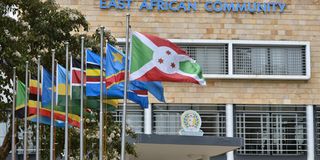Political federation set to top agenda at EAC summit

The East African Community (EAC) headquarters in Arusha. The EAC heads of state are expected to discuss proposals on the drafting of a political federation constitution during their November 30 summit in Arusha. PHOTO | FILE
What you need to know:
- East African Community (EAC) heads of state are expected to discuss proposals on the drafting of a political federation constitution during their upcoming summit in Arusha
Arusha. East African Community (EAC) heads of state are expected to discuss proposals on the drafting of a political federation constitution during their upcoming summit in Arusha.
South Sudan President Salva Kiir Mayardit, who is the current chairperson of the EAC Summit, will lead the discussion during the 24th Ordinary Summit scheduled for November 30.
The meeting will coincide with celebrations to mark the 25th anniversary of the establishment of the EAC.
The EAC is a regional intergovernmental organisation comprising eight partner states – Tanzania, Kenya Uganda, Rwanda, Burundi, South Sudan, DR Congo and Somalia – with its headquarters in Arusha.
EAC secretary-general Veronica Nduva said on Thursday that the establishment of the constitution was a proposal from the previous summit.
The EAC is continuing to monitor the progress of the Committee of Experts tasked with drafting the constitution of the envisaged EAC Political Federation, she added.
“The committee has already completed consultations with stakeholders in Burundi, Uganda and Kenya," Ms Nduva said, adding that consultations were ongoing with stakeholders in DR Congo, Rwanda, Somalia, South Sudan and Tanzania.
“We expect to conclude these consultations with the remaining partner states by June 30, 2025.”
During the anniversary celebrations, delegates at the summit will also discuss the achievements, challenges and the future direction of the EAC, along with proposals to improve the overall functioning of the community and the role of digital transformation in the integration process.
One of the key achievements of the EAC, according to Ms Nduva, is the growth of intra-regional trade, which reached $10.17 billion in September 2022, representing a 20 percent increase from $7.1 billion in 2019.
“This increase in intra-regional trade is due to the political goodwill among the heads of state, who have held high-level discussions regularly to eliminate many non-tariff barriers that hinder cross-border trade in East Africa,” Ms Nduva said.
The celebrations will also mark the launch of a new EAC emblem, which now represents eight countries, to replace the previous emblem that only represented the three founding members – Tanzania, Kenya and Uganda.
East African Court of Justice (EACJ) president Nestor Kayobera said the 25th anniversary celebrations are in line with the rights and responsibilities of the EACJ.
“Rights and responsibilities are key to economic growth. The successes of the EAC are also a source of pride for us, as we are part of these successes,” he said.




